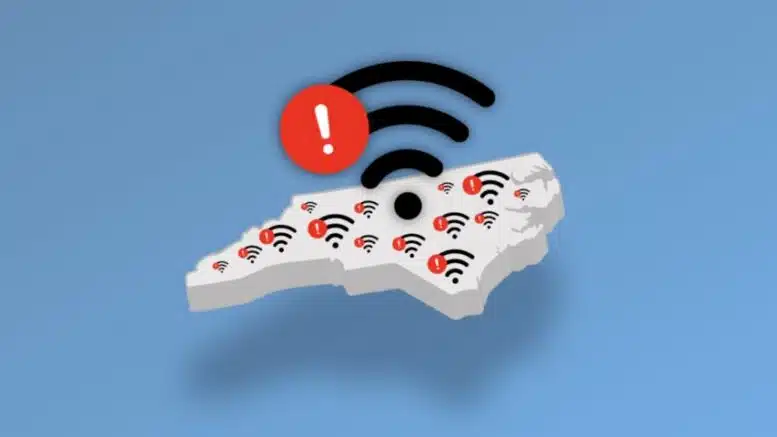By Jaymie Baxley
In September 2023, Sara Nichols went before the Committee on Energy and Commerce in the U.S. House of Representatives in Washington, D.C., to advocate for the continuation of a federal program that has provided more than 900,000 low-income North Carolinians with help paying for internet access.
Created through a sweeping infrastructure package approved by Congress in 2021, the Affordable Connectivity Program offered high-speed internet at little to no cost for families who earned less than 200 percent of the federal poverty level ($51,640 for a family of three) or were enrolled in government assistance programs such as Medicaid and SNAP. Nichols saw the impact of the program firsthand as a senior planner for the Land of Sky Regional Council, a government development organization that serves rural communities in western North Carolina.
Her section of the region — a mountainous cluster that includes Buncombe, Henderson, Madison and Transylvania counties — experienced a surge in population during the COVID-19 pandemic. Addressing Congressional leaders, she said the sudden growth “drove up the cost of living” for longtime residents. It also “escalated the importance of our broadband connectivity challenges.”
“While the pandemic exacerbated the challenges, communities in WNC were already painfully aware that broadband is essential for participation in the 21st-century economy and society,” she told Congress. “It is how we work, learn, connect with friends and family, and access health care and government services.”
The Affordable Connectivity Program had been a lifeline for tens of thousands of households in the economically distressed region. Nichols said it gave participants the ability “to search for jobs, attend classes, acquire skills and pursue health care remotely.”
“It’s a program we simply can’t afford to lose,” she said.
The outlook for the program’s survival has grown increasingly bleak in the months since Nichols’ testimony. Funding for the ACP is about to dry up, forcing more than 23 million beneficiaries across the nation to either disconnect or figure out a way to pay the full cost for internet service.
There is still time for Congress to act, but Nichols said she isn’t holding her breath.
“I don’t have a lot of confidence that we’ll find a solution by the time this funding runs out,” she said in a recent interview. “I have more confidence that we will see another solution at some point, maybe after the election.”
April is the last fully funded month for the Affordable Connectivity Program, but the Federal Communications Commission said there is enough money left to offer reduced subsidies to participants in May. On April 9, the agency announced that next month’s maximum reimbursement rate will decrease from $30 to $14 for households that are not on tribal lands. The benefit for tribal households will drop from $75 to $35.
Health consequences
With 8.6 percent of households participating, North Carolina has the nation’s ninth largest percentage of ACP enrollees relative to its population.
Nichols said the loss of the subsidies would be especially harmful in her rural region, which is part of the state’s 11th congressional district. The ACP covers more than 44,660 households in the district, or nearly 11 percent of its estimated 407,945 housing units.
Many of the district’s residents lack transportation or live far away from health care providers. High speed internet allows them to connect with providers remotely.
“By and large, a lot of health care appointments are routine enough that they can be managed with telehealth,” Nichols said. “Particularly, mental health is a great fit for telehealth because there might not be as much need to touch and weigh and measure [patients].”
Without the ACP, she believes rural communities will “continue to struggle with their ability to manage their health care and how much time they spend doing it.”
“They’ll be less likely to come in for routine appointments,” she said. “They will be less likely to be able to get to specialists.”
A feasibility study conducted by the N.C. Division of Broadband and Digital Equity, part of the state’s Department of Information Technology, found that “a disproportionate number” of people in the Appalachian region of western North Carolina “live without access to basic health care services and access to specialists like cardiologists, because of distance and limited provider availability.”
The study also found that “health care access is improved” in parts of the region where broadband and telehealth services exist, and “patients are more aware of their conditions and equipped with self management techniques to alert their health care professional when concerns arise.”
The end of the ACP could have other consequences. Nichols fears that people who cannot afford to pay for internet service without the subsidies will be left with debt if they fail to cancel their service before the program is discontinued.
“What I don’t want to see happen is that we signed somebody up for this program and they didn’t know how to shut it off because they didn’t really understand fully all of the ins and outs,” she said. “Then they get sent to collections and they don’t pay their bill because they didn’t ever have one before they got sent to collections.”
‘Past time’ to act
President Joe Biden has been urging Congress to approve the $6 billion needed to extend the program through 2024 since October, but his calls have been met with inaction from Republican lawmakers.
Stephen Benjamin, the president’s senior adviser for public engagement, addressed the looming deadline last week during a conference call with reporters. High speed internet, he said, “is necessary for Americans to participate in school, do their jobs, access health care and stay connected to loved ones.”
“Yet millions of Americans can’t afford the cost of monthly internet connection, if they have access to connection at all,” Benjamin said. “These disparities disproportionately impact communities of color, veterans and military families, rural communities and older Americans.”
He said the ACP was created “to bridge this divide.” The program now covers one in every six households across the United States, with military families accounting for nearly half of all enrollment.
“If congressional Republicans fail to act, 23 million Americans, including many of their own constituents, will lose access to affordable high speed internet and may not be able to access the benefits it brings like access to education, telemedicine, job opportunities and more,” Benjamin said. “It’s past time for Congressional Republicans to step up and prevent their constituents’ internet costs from increasing in the coming weeks.”
There does appear to be some bipartisan support for the ACP among elected leaders in and from North Carolina.
Last June, Republican U.S. Sen. Thom Tillis added his signature to a letter asking the White House to put unused COVID-19 relief funding toward the program. The N.C. Association of County Commissioners has also come out in support of the ACP.
“Several Republican and Democratic federal representatives and state legislators find value in the Affordable Connectivity Program,” Emily Gangi, policy director for the Division of Broadband and Digital Equity, said during a summit convened in Raleigh last month by the N.C. Rural Center.
She added that the success of a $2.5 billion plan to improve the state’s broadband infrastructure hinges on residents being able to afford high speed internet once the infrastructure is in place.
“[Lawmakers] recognize that it’s not going to do any good to spend $2 billion to build that infrastructure if so many households in our state can’t afford to subscribe to it,” Gangi said.
Listen: Reporter Jaymie Baxley talks about the fate of the ACP on WFAE’s “Morning Edition.”














